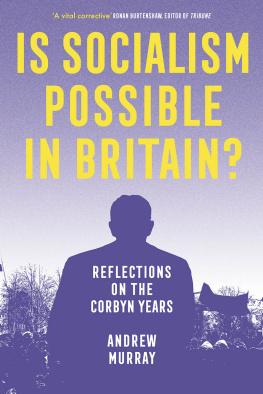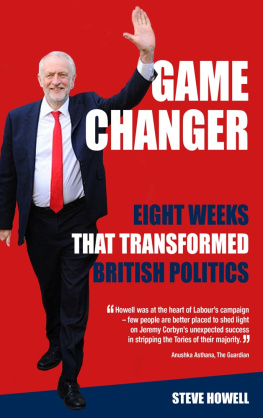

Jeremy Corbyns Labour stands on the brink of power, promising a fundamental re-ordering of British politics. But what, in practice, will this entail? How can a radical government stand up to an establishment that is hostile to any significant redistribution of wealth and power? People Get Ready! dives into the nitty gritty of whats needed to bring about transformative change.
Unlike a decade ago, the lefts problem is no longer a shortage of big ideas. Inside and outside the Labour Party, an agenda for new forms of public and community ownership is taking shape. Today the biggest danger facing the left is lack of preparedness the absence of strategies that can make these ideas a reality.
People Get Ready! draws on previous attempts at radical change, from the election of Labour at the end of the Second World War and the progressive early days of Mitterrands presidency in France, to Tony Benns battles with Harold Wilson and Margaret Thatchers icy insistence that there was no alternative to free markets. These stories highlight the importance of knowing your allies and, even more, your enemies, of being ready to deal with sabotage and resistance from the highest levels, of being bold enough to transform the structures of government, and of having a mass movement that can both support the leadership and hold it to its radical programme when the going gets tough.
Remarkably, democratic socialism in Britain is closer to government than in any other European country. The responsibilities this brings for those supporting the Corbyn project are as great as the opportunities it presents. But there isnt much time to get ready


2019 Christine Berry and Joe Guinan
All rights information:
Visit our website at www.orbooks.com
First printing 2019
All rights reserved. No part of this book may be reproduced or transmitted in any form or by any means, electronic or mechanical, including photocopy, recording, or any information storage retrieval system, without permission in writing from the publisher, except brief passages for review purposes.
Library of Congress Cataloging-in-Publication Data: A catalog record for this book is available from the Library of Congress.
British Library Cataloging in Publication Data: A catalog record for this book is available from the British Library.
Typeset by Lapiz Digital. Printed by BookMobile, USA, and CPI, UK.
paperback ISBN 978-1-68219-197-2 ebook ISBN 978-1-68219-198-9
In loving memory of June Berry and Martin Guinan
CONTENTS
PREFACE AND ACKNOWLEDGMENTS
We both grew up in the monstrously elongated shadow of Thatcherism in Britain; consider this book our small revenge. The book was written at great speed over a couple of months in the late summer and early autumn of 2018. Our haste stemmed from our sense of hope at the historic opportunities being opened up by the Corbyn project, together with a growing foreboding that, collectively, we are not yet ready for the mammoth challenges ahead. We wanted urgently to help address what we perceived to be the lack of deep movement conversation around strategies for actually accomplishing transformative change. In writing this quick book we have thus taken many short cuts and turned away from the temptations of deeper investigations into areas we find interesting or compelling in favour of rapid intervention in Britains constantly fluctuating and changing political-economic landscape. We are well aware of some shortcomings and omissions as a result.
We therefore offer up what follows as a conversation-starter rather than any claim to the last word. We are operating throughout at the level of broad-brush suggestion rather than definitive pronouncement or prediction. We certainly do not contend that we have everything right. Instead, we hope that we are asking some of the right questions at the right level for the development of the next phase of Corbynism: preparedness . To that end, we conclude with a Movement Discussion Guide, designed to facilitate ongoing conversation and debate about a number of the thorny strategic issues we have raised.
When explaining what we were setting out to accomplish with this short book, a colleague described it back to us as an old-fashioned political pamphletlike Common Sense . We are flattered by the comparison with Tom Paine (especially since one of us writes from voluntary exile in the United States) and embrace the characterisation of what follows as not a detached study but rather a sustained political argument or even a polemic. As will quickly become apparent, we are committed supporters of the Corbyn projectbut also (we hope) critical friends, concerned at what we see as a missing strategic dimension to the current political conversation. While weve shared in the surging optimism and euphoria of the past couple of years, as the horizons of the possible in Britain have been radically expanded and the shimmering hope of a better future has reappeared miraculously ahead, we are also acutely aware of the tremendous challenges that remain and obstacles still to be overcome.
The purpose of our bookalerting the fledgling movement that is Corbynism to a number of dilemmas we see ahead at the level of politics, policy, and preparednessmeans that it is aimed principally at the Corbyn base of Labour Party and Momentum members, political activists, trade unionists, campaigners, and community organisers, as well as assorted well-wishers and (with a bit of luck) a broader supportive public. We hope it will also be of interest to those of all progressive parties and none who wish to be part of transforming our economy and society beyond neoliberalism.
As such, what follows should be seen as an intervention for the particular moment were in, not a tract for the ages. We were aware even as we wrote that the fast pace of current events could quickly supersede aspects of our argument or render it obsolete before it could appear in the world, even at the breakneck speed offered by O/R Books, our publisher. Such are the hazards of pamphleteeringespecially in an era like the present that recalls the dictum, attributed to Lenin, of there being decades in which nothing happens and weeks in which decades happen.
As a collaboration between its authors, this book also contains compromises. Fortunately, we are substantially in agreement on the argument that follows, although there are some aspects that each of us might have put slightly differently. The tight timeline and division of labour on the manuscript has also required that we place a lot of trust in one another. On a couple of issues, most notably Brexit, we have larger differences, reflecting wider debates on the UK left. We have somewhat sidestepped these, not because we do not think they are important, but for the sake of the overall argument and because it seemed fruitless to attempt to speculate on the context into which this book will be published, on the other side of the 29 March 2019 date set for the UKs departure from the European Union. We do, however, share a view that the UK leftas divided over Brexit as the rest of the countrywill need to come back together not merely around a different economic model domestically but also around a post-neoliberal vision for the international economy and a redefinition of the UKs role in the world. We applaud John McDonnells recent leadership on these vital questions.
Next page















